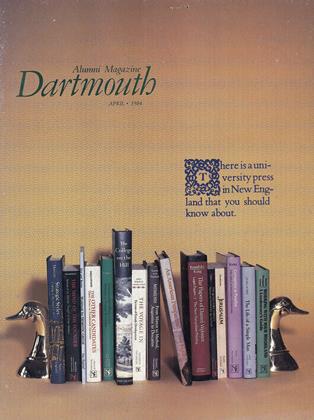The massive task of editing the letters of novelist Joseph Conrad has been undertaken by Dartmouth College faculty member Laurence-Davies. The job is massive because Conrad, author of Lord Jim, Heart of Darkness, and other novels, was a most prolific writer of letters. His 4,500 surviving letters, many previously unpublished, will fill eight volumes. Sometime in the early 1990s, if all goes well, the final volume will be published.
Davies, a senior lecturer in English, is working with co-editor Frederick Karl, a professor of English at New York University. Basically, Karl finds, reads, and copies the letters. Davies then "provides a framework" for publication. He adds annotations and introductory material and sees the whole process through printing.
Conrad, although a native of Poland, is considered one of the great novelists in English literature. Born in 1857, he went to sea in 1874. In 1894 he retired from the sea and began his writing career. Throughout his life he wrote letters, though his output was far heavier in his later years than in the sailing days when he was often long at sea. He died in 1924.
Davies began the Conrad project in 1976. Working evenings and weekends and in terms free from teaching, he has completed two of eight volumes. The work will now go faster. Supported by a grant from the National Endowment for the Humanities, Davies is about to begin two years of uninterrupted work on Conrad. By the end of those two years, volumes three through five of The Collected Letters of Joseph Conrad should be ready for the Cambridge University Press.
Davies describes himself as "something of an insomniac" and as having a mind "something like a 5,000-yard roll of flypaper." Those qualities are helpful in simply getting the job done and in locating information to annotate the letters, to put them in context for persons less familiar with Conrad than is Davies. "The task calls for much compulsive fiddling, a passion for tiny details, and a desire to make things clear," he said. Fortunately, Conrad wrote in very legible hand. Later in life when he grew shaky, he typed.
Davies has read as many of Conrad's letters as anyone alive, virtually all that exist. Yet he cautions himself about assuming he totally understands the author. Despite the existence of 4,500 letters, Davies said, "I wouldn't profess to understand him. You have to take into account the silences, the absences. And he didn't correspond with some of his best friends. They were neighbors. He talked to them."
He has found Conrad time and again "communicating solitude." Other writers have contended that Conrad may have been a manic depressive. Davies believes the contention may have "some accuracy." In troubled times, Conrad found himself unable to write. Davies has shared letters describing those times with students,
Conrad wrote in part, Davies said, because there were no telephones ("he wouldn't have liked them anyway") and because of the marvelous efficiency of the British postal service. "Sometimes I find that he would write a letter to someone in London in the morning, get a letter back in the afternoon, and write another letter to that person in the afternoon," said Davies.
Primary sources for Conrad letters have included Yale, the New York Public Library, Philadelphia's Rosenbach Foundation, and Dartmouth. The College owns some 80 of the very best Conrad letters, those sent to friend and fellow writer R. B. Cunninghame Graham. Davies came to the Conrad effort after writing a book on Graham.
Davies, 42, who was born in Wales, holds a B.A. with honors from Oxford and a Ph.D. from the University of Sussex. He joined the Dartmouth faculty in 1977.
Judgment follows knowledge, and knowledge is slow, and hard, and late, the outcome of humility, and patience, and charity. William Jewett Tucker in 1910
 View Full Issue
View Full Issue
More From This Issue
-
 Cover Story
Cover StoryConsortium
April 1984 By Shelby Grantham -
 Feature
FeatureHanover Sabbatical
April 1984 By Robert Conn '61 -
 Feature
FeatureCenters of Excellence and the Survival of Creativity
April 1984 By O. Ross Mclntyre '53 -
 Feature
FeatureRobert Frost Keeps Me Company Often Uninvited
April 1984 By Kenneth Andler '26 -
 Article
ArticleIt's Just Like Talking to People
April 1984 By Debbie Schupack '84 -
 Class Notes
Class Notes1959
April 1984 By William G. Long
Article
-
 Article
ArticleOrvil E. Dryfoos '34 Nominee for Trustee
March 1960 -
 Article
ArticleThe Oxford Plan Attacked
JANUARY, 1928 By "F. Clark S. '30." -
 Article
ArticleA Course in the Department of Biography
November, 1930 By Harold E. B. Speight -
 Article
ArticleHanover Browsing
May 1937 By HERBERT F. WEST '22 -
 Article
ArticleThe Canoe Club
June 1947 By Pete Owen '47 -
 Article
ArticleThe Joy of Moving
November 1978 By W.B.C.

